Literary Analysis: The Wars by Timothy Findley and Loss of Innocence
VerifiedAdded on 2022/08/20
|5
|1359
|13
Essay
AI Summary
This essay provides a literary analysis of Timothy Findley's novel, The Wars, focusing on the central theme of the loss of innocence. The essay examines how the traumatic experiences of World War I, as depicted through the protagonist Robert Ross, lead to the destruction of innocence. It analyzes specific scenes and quotes from the novel, such as the killing of the rabbits and the soldiers' experiences in the trenches, to illustrate the psychological and emotional toll of war. The analysis explores how the characters' responses to violence, death, and the harsh realities of war contribute to their loss of innocence and the broader disillusionment of the era. The essay incorporates secondary sources to support its arguments, providing a comprehensive understanding of the novel's themes and its critique of war's impact on individuals and society.
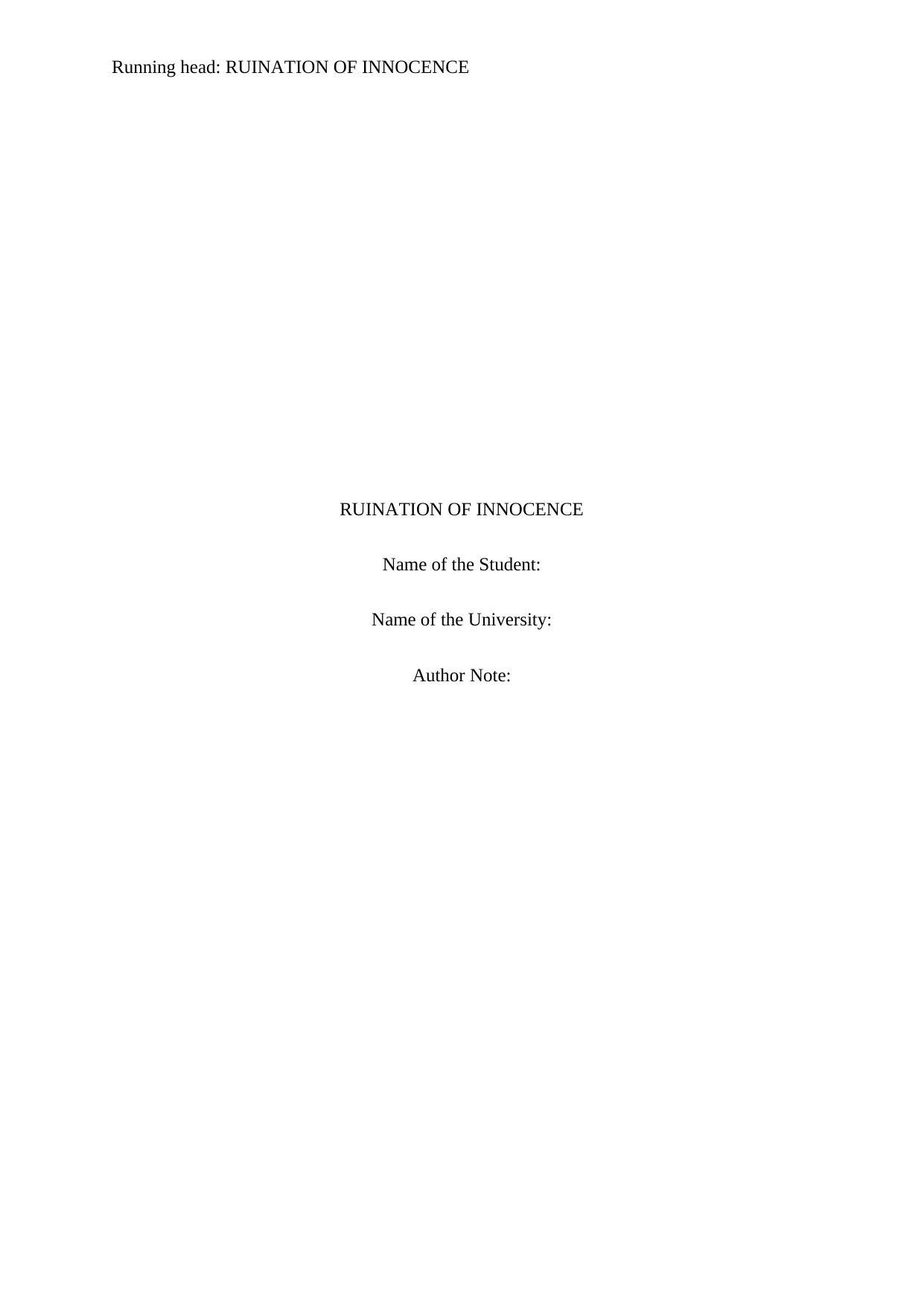
Running head: RUINATION OF INNOCENCE
RUINATION OF INNOCENCE
Name of the Student:
Name of the University:
Author Note:
RUINATION OF INNOCENCE
Name of the Student:
Name of the University:
Author Note:
Paraphrase This Document
Need a fresh take? Get an instant paraphrase of this document with our AI Paraphraser
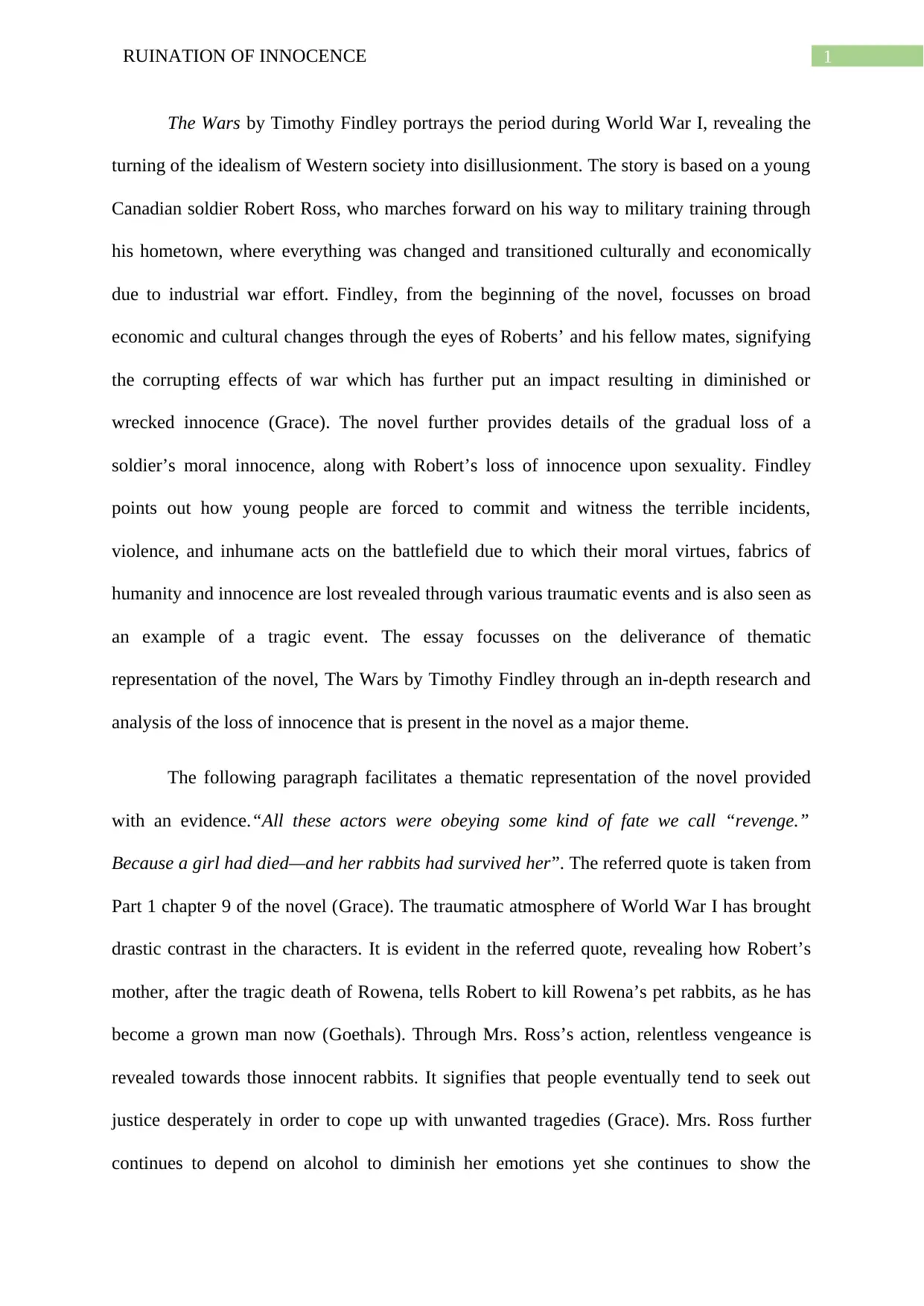
1RUINATION OF INNOCENCE
The Wars by Timothy Findley portrays the period during World War I, revealing the
turning of the idealism of Western society into disillusionment. The story is based on a young
Canadian soldier Robert Ross, who marches forward on his way to military training through
his hometown, where everything was changed and transitioned culturally and economically
due to industrial war effort. Findley, from the beginning of the novel, focusses on broad
economic and cultural changes through the eyes of Roberts’ and his fellow mates, signifying
the corrupting effects of war which has further put an impact resulting in diminished or
wrecked innocence (Grace). The novel further provides details of the gradual loss of a
soldier’s moral innocence, along with Robert’s loss of innocence upon sexuality. Findley
points out how young people are forced to commit and witness the terrible incidents,
violence, and inhumane acts on the battlefield due to which their moral virtues, fabrics of
humanity and innocence are lost revealed through various traumatic events and is also seen as
an example of a tragic event. The essay focusses on the deliverance of thematic
representation of the novel, The Wars by Timothy Findley through an in-depth research and
analysis of the loss of innocence that is present in the novel as a major theme.
The following paragraph facilitates a thematic representation of the novel provided
with an evidence.“All these actors were obeying some kind of fate we call “revenge.”
Because a girl had died—and her rabbits had survived her”. The referred quote is taken from
Part 1 chapter 9 of the novel (Grace). The traumatic atmosphere of World War I has brought
drastic contrast in the characters. It is evident in the referred quote, revealing how Robert’s
mother, after the tragic death of Rowena, tells Robert to kill Rowena’s pet rabbits, as he has
become a grown man now (Goethals). Through Mrs. Ross’s action, relentless vengeance is
revealed towards those innocent rabbits. It signifies that people eventually tend to seek out
justice desperately in order to cope up with unwanted tragedies (Grace). Mrs. Ross further
continues to depend on alcohol to diminish her emotions yet she continues to show the
The Wars by Timothy Findley portrays the period during World War I, revealing the
turning of the idealism of Western society into disillusionment. The story is based on a young
Canadian soldier Robert Ross, who marches forward on his way to military training through
his hometown, where everything was changed and transitioned culturally and economically
due to industrial war effort. Findley, from the beginning of the novel, focusses on broad
economic and cultural changes through the eyes of Roberts’ and his fellow mates, signifying
the corrupting effects of war which has further put an impact resulting in diminished or
wrecked innocence (Grace). The novel further provides details of the gradual loss of a
soldier’s moral innocence, along with Robert’s loss of innocence upon sexuality. Findley
points out how young people are forced to commit and witness the terrible incidents,
violence, and inhumane acts on the battlefield due to which their moral virtues, fabrics of
humanity and innocence are lost revealed through various traumatic events and is also seen as
an example of a tragic event. The essay focusses on the deliverance of thematic
representation of the novel, The Wars by Timothy Findley through an in-depth research and
analysis of the loss of innocence that is present in the novel as a major theme.
The following paragraph facilitates a thematic representation of the novel provided
with an evidence.“All these actors were obeying some kind of fate we call “revenge.”
Because a girl had died—and her rabbits had survived her”. The referred quote is taken from
Part 1 chapter 9 of the novel (Grace). The traumatic atmosphere of World War I has brought
drastic contrast in the characters. It is evident in the referred quote, revealing how Robert’s
mother, after the tragic death of Rowena, tells Robert to kill Rowena’s pet rabbits, as he has
become a grown man now (Goethals). Through Mrs. Ross’s action, relentless vengeance is
revealed towards those innocent rabbits. It signifies that people eventually tend to seek out
justice desperately in order to cope up with unwanted tragedies (Grace). Mrs. Ross further
continues to depend on alcohol to diminish her emotions yet she continues to show the
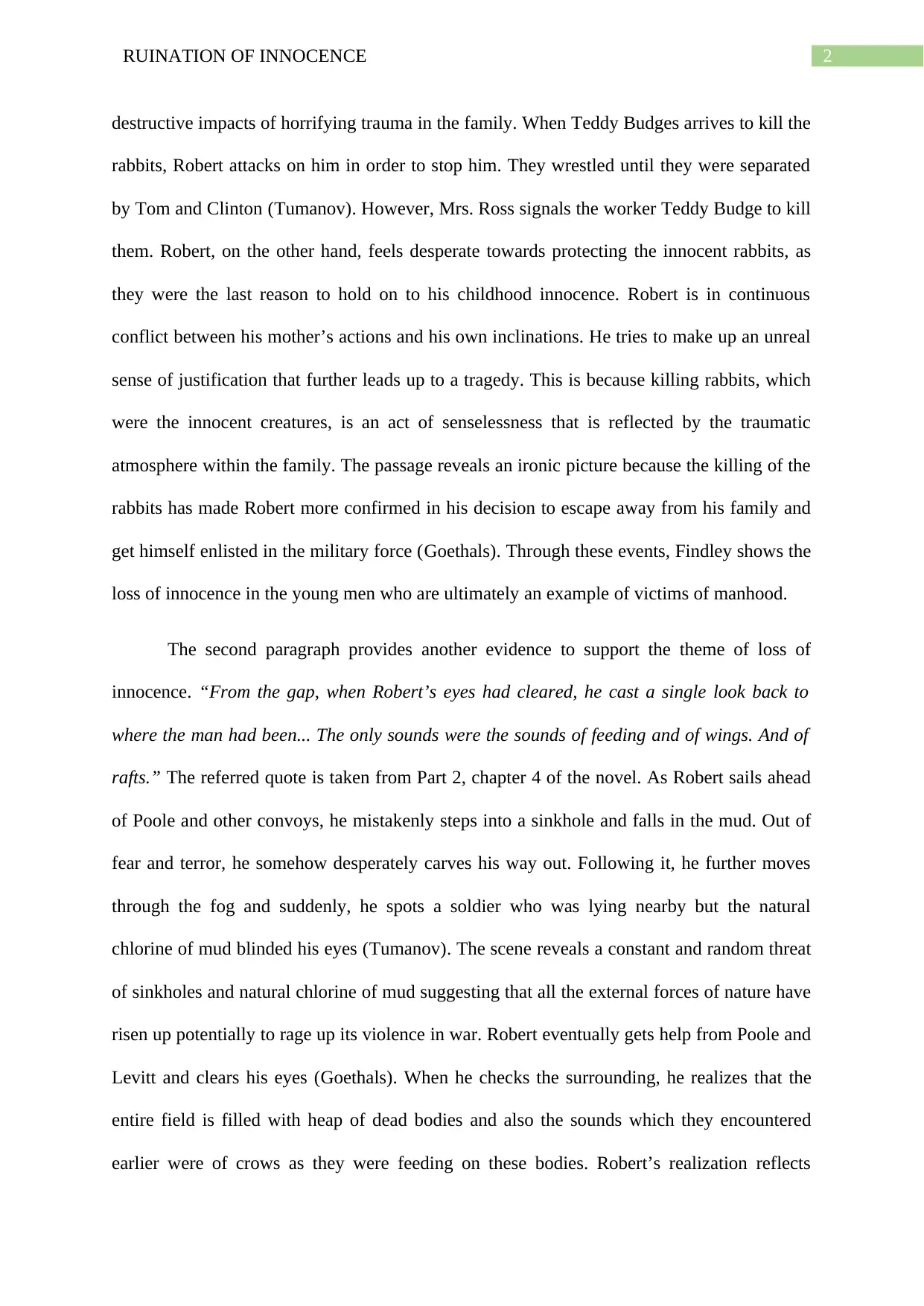
2RUINATION OF INNOCENCE
destructive impacts of horrifying trauma in the family. When Teddy Budges arrives to kill the
rabbits, Robert attacks on him in order to stop him. They wrestled until they were separated
by Tom and Clinton (Tumanov). However, Mrs. Ross signals the worker Teddy Budge to kill
them. Robert, on the other hand, feels desperate towards protecting the innocent rabbits, as
they were the last reason to hold on to his childhood innocence. Robert is in continuous
conflict between his mother’s actions and his own inclinations. He tries to make up an unreal
sense of justification that further leads up to a tragedy. This is because killing rabbits, which
were the innocent creatures, is an act of senselessness that is reflected by the traumatic
atmosphere within the family. The passage reveals an ironic picture because the killing of the
rabbits has made Robert more confirmed in his decision to escape away from his family and
get himself enlisted in the military force (Goethals). Through these events, Findley shows the
loss of innocence in the young men who are ultimately an example of victims of manhood.
The second paragraph provides another evidence to support the theme of loss of
innocence. “From the gap, when Robert’s eyes had cleared, he cast a single look back to
where the man had been... The only sounds were the sounds of feeding and of wings. And of
rafts.” The referred quote is taken from Part 2, chapter 4 of the novel. As Robert sails ahead
of Poole and other convoys, he mistakenly steps into a sinkhole and falls in the mud. Out of
fear and terror, he somehow desperately carves his way out. Following it, he further moves
through the fog and suddenly, he spots a soldier who was lying nearby but the natural
chlorine of mud blinded his eyes (Tumanov). The scene reveals a constant and random threat
of sinkholes and natural chlorine of mud suggesting that all the external forces of nature have
risen up potentially to rage up its violence in war. Robert eventually gets help from Poole and
Levitt and clears his eyes (Goethals). When he checks the surrounding, he realizes that the
entire field is filled with heap of dead bodies and also the sounds which they encountered
earlier were of crows as they were feeding on these bodies. Robert’s realization reflects
destructive impacts of horrifying trauma in the family. When Teddy Budges arrives to kill the
rabbits, Robert attacks on him in order to stop him. They wrestled until they were separated
by Tom and Clinton (Tumanov). However, Mrs. Ross signals the worker Teddy Budge to kill
them. Robert, on the other hand, feels desperate towards protecting the innocent rabbits, as
they were the last reason to hold on to his childhood innocence. Robert is in continuous
conflict between his mother’s actions and his own inclinations. He tries to make up an unreal
sense of justification that further leads up to a tragedy. This is because killing rabbits, which
were the innocent creatures, is an act of senselessness that is reflected by the traumatic
atmosphere within the family. The passage reveals an ironic picture because the killing of the
rabbits has made Robert more confirmed in his decision to escape away from his family and
get himself enlisted in the military force (Goethals). Through these events, Findley shows the
loss of innocence in the young men who are ultimately an example of victims of manhood.
The second paragraph provides another evidence to support the theme of loss of
innocence. “From the gap, when Robert’s eyes had cleared, he cast a single look back to
where the man had been... The only sounds were the sounds of feeding and of wings. And of
rafts.” The referred quote is taken from Part 2, chapter 4 of the novel. As Robert sails ahead
of Poole and other convoys, he mistakenly steps into a sinkhole and falls in the mud. Out of
fear and terror, he somehow desperately carves his way out. Following it, he further moves
through the fog and suddenly, he spots a soldier who was lying nearby but the natural
chlorine of mud blinded his eyes (Tumanov). The scene reveals a constant and random threat
of sinkholes and natural chlorine of mud suggesting that all the external forces of nature have
risen up potentially to rage up its violence in war. Robert eventually gets help from Poole and
Levitt and clears his eyes (Goethals). When he checks the surrounding, he realizes that the
entire field is filled with heap of dead bodies and also the sounds which they encountered
earlier were of crows as they were feeding on these bodies. Robert’s realization reflects
⊘ This is a preview!⊘
Do you want full access?
Subscribe today to unlock all pages.

Trusted by 1+ million students worldwide
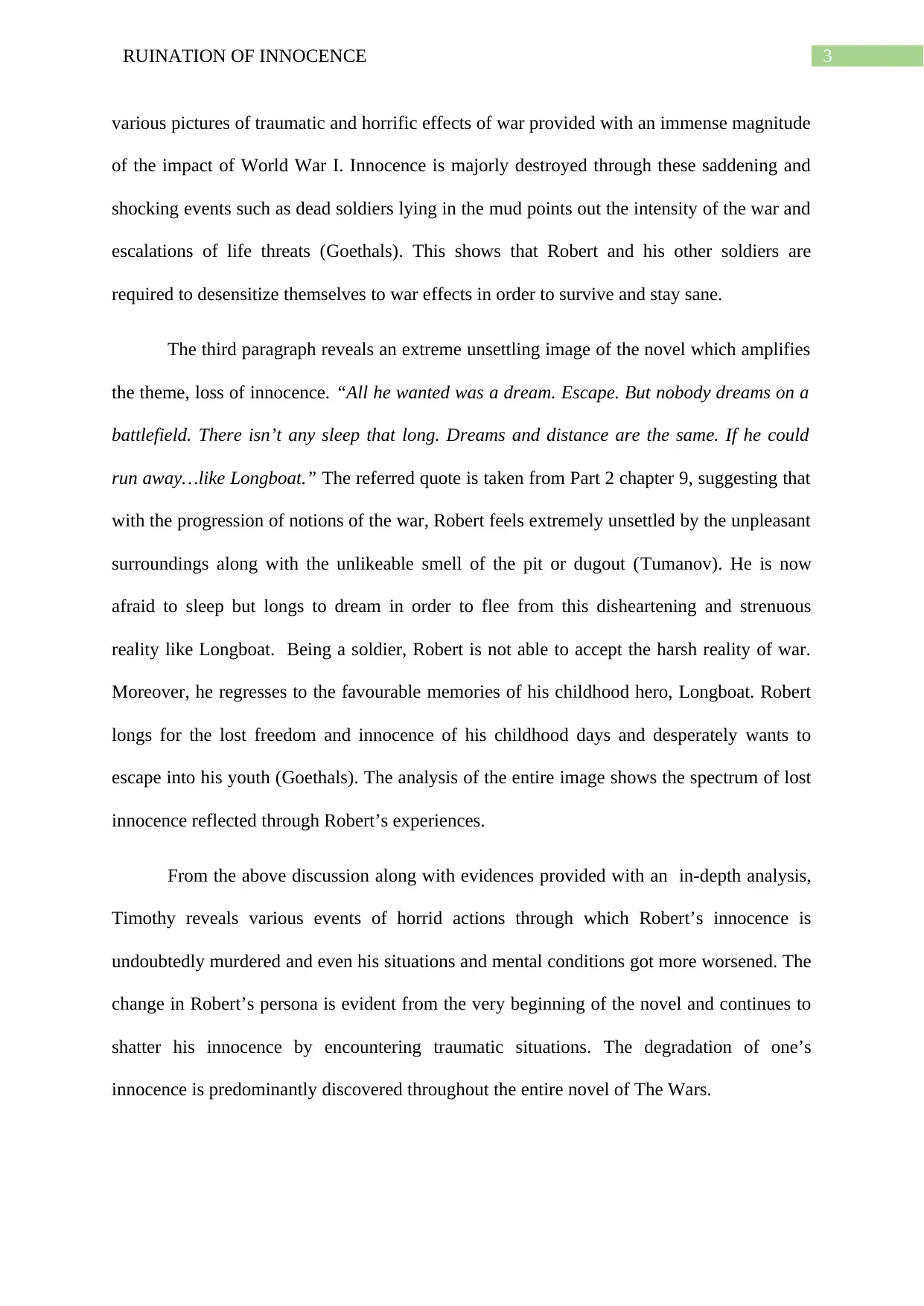
3RUINATION OF INNOCENCE
various pictures of traumatic and horrific effects of war provided with an immense magnitude
of the impact of World War I. Innocence is majorly destroyed through these saddening and
shocking events such as dead soldiers lying in the mud points out the intensity of the war and
escalations of life threats (Goethals). This shows that Robert and his other soldiers are
required to desensitize themselves to war effects in order to survive and stay sane.
The third paragraph reveals an extreme unsettling image of the novel which amplifies
the theme, loss of innocence. “All he wanted was a dream. Escape. But nobody dreams on a
battlefield. There isn’t any sleep that long. Dreams and distance are the same. If he could
run away…like Longboat.” The referred quote is taken from Part 2 chapter 9, suggesting that
with the progression of notions of the war, Robert feels extremely unsettled by the unpleasant
surroundings along with the unlikeable smell of the pit or dugout (Tumanov). He is now
afraid to sleep but longs to dream in order to flee from this disheartening and strenuous
reality like Longboat. Being a soldier, Robert is not able to accept the harsh reality of war.
Moreover, he regresses to the favourable memories of his childhood hero, Longboat. Robert
longs for the lost freedom and innocence of his childhood days and desperately wants to
escape into his youth (Goethals). The analysis of the entire image shows the spectrum of lost
innocence reflected through Robert’s experiences.
From the above discussion along with evidences provided with an in-depth analysis,
Timothy reveals various events of horrid actions through which Robert’s innocence is
undoubtedly murdered and even his situations and mental conditions got more worsened. The
change in Robert’s persona is evident from the very beginning of the novel and continues to
shatter his innocence by encountering traumatic situations. The degradation of one’s
innocence is predominantly discovered throughout the entire novel of The Wars.
various pictures of traumatic and horrific effects of war provided with an immense magnitude
of the impact of World War I. Innocence is majorly destroyed through these saddening and
shocking events such as dead soldiers lying in the mud points out the intensity of the war and
escalations of life threats (Goethals). This shows that Robert and his other soldiers are
required to desensitize themselves to war effects in order to survive and stay sane.
The third paragraph reveals an extreme unsettling image of the novel which amplifies
the theme, loss of innocence. “All he wanted was a dream. Escape. But nobody dreams on a
battlefield. There isn’t any sleep that long. Dreams and distance are the same. If he could
run away…like Longboat.” The referred quote is taken from Part 2 chapter 9, suggesting that
with the progression of notions of the war, Robert feels extremely unsettled by the unpleasant
surroundings along with the unlikeable smell of the pit or dugout (Tumanov). He is now
afraid to sleep but longs to dream in order to flee from this disheartening and strenuous
reality like Longboat. Being a soldier, Robert is not able to accept the harsh reality of war.
Moreover, he regresses to the favourable memories of his childhood hero, Longboat. Robert
longs for the lost freedom and innocence of his childhood days and desperately wants to
escape into his youth (Goethals). The analysis of the entire image shows the spectrum of lost
innocence reflected through Robert’s experiences.
From the above discussion along with evidences provided with an in-depth analysis,
Timothy reveals various events of horrid actions through which Robert’s innocence is
undoubtedly murdered and even his situations and mental conditions got more worsened. The
change in Robert’s persona is evident from the very beginning of the novel and continues to
shatter his innocence by encountering traumatic situations. The degradation of one’s
innocence is predominantly discovered throughout the entire novel of The Wars.
Paraphrase This Document
Need a fresh take? Get an instant paraphrase of this document with our AI Paraphraser
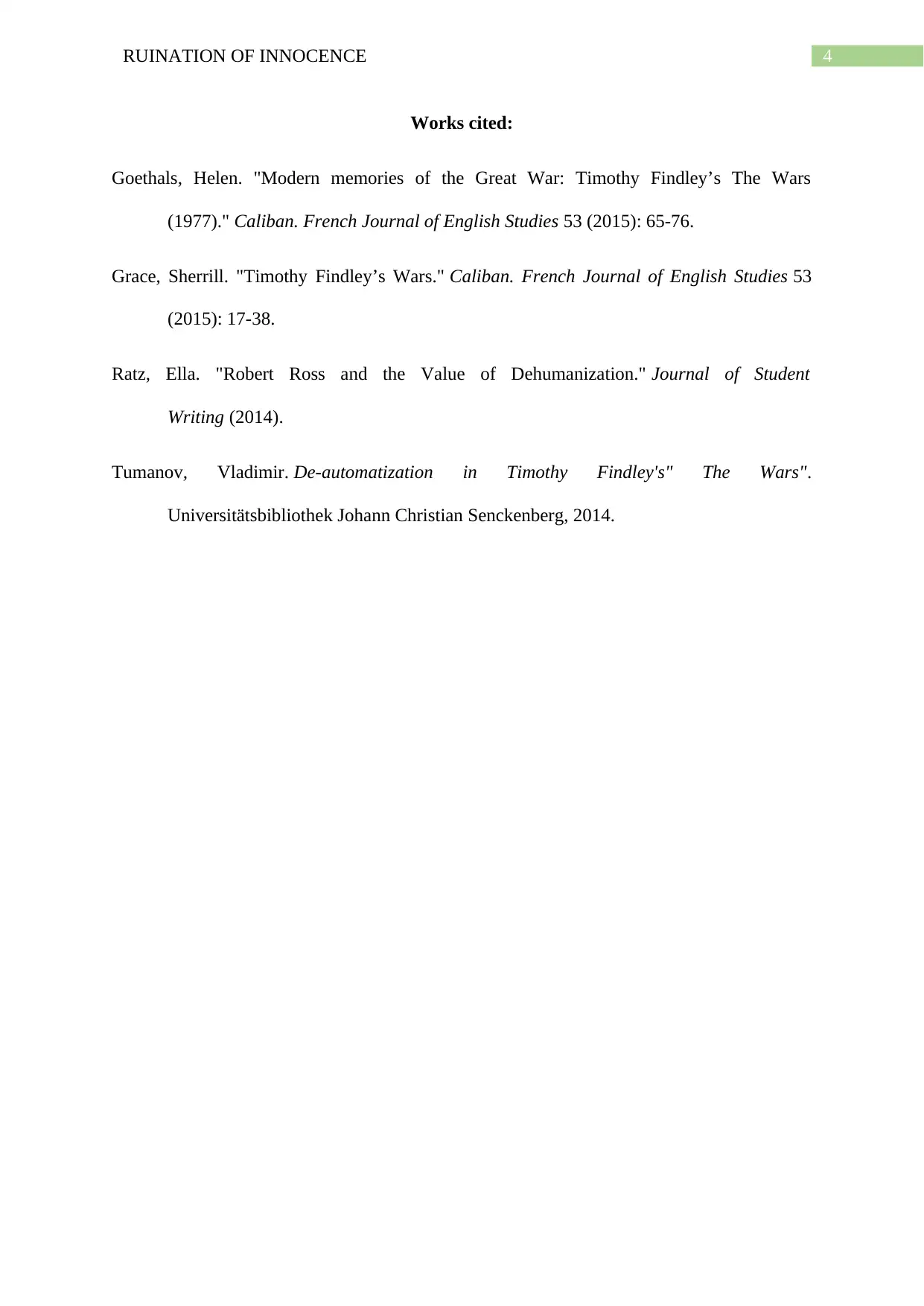
4RUINATION OF INNOCENCE
Works cited:
Goethals, Helen. "Modern memories of the Great War: Timothy Findley’s The Wars
(1977)." Caliban. French Journal of English Studies 53 (2015): 65-76.
Grace, Sherrill. "Timothy Findley’s Wars." Caliban. French Journal of English Studies 53
(2015): 17-38.
Ratz, Ella. "Robert Ross and the Value of Dehumanization." Journal of Student
Writing (2014).
Tumanov, Vladimir. De-automatization in Timothy Findley's" The Wars".
Universitätsbibliothek Johann Christian Senckenberg, 2014.
Works cited:
Goethals, Helen. "Modern memories of the Great War: Timothy Findley’s The Wars
(1977)." Caliban. French Journal of English Studies 53 (2015): 65-76.
Grace, Sherrill. "Timothy Findley’s Wars." Caliban. French Journal of English Studies 53
(2015): 17-38.
Ratz, Ella. "Robert Ross and the Value of Dehumanization." Journal of Student
Writing (2014).
Tumanov, Vladimir. De-automatization in Timothy Findley's" The Wars".
Universitätsbibliothek Johann Christian Senckenberg, 2014.
1 out of 5
Your All-in-One AI-Powered Toolkit for Academic Success.
+13062052269
info@desklib.com
Available 24*7 on WhatsApp / Email
![[object Object]](/_next/static/media/star-bottom.7253800d.svg)
Unlock your academic potential
Copyright © 2020–2025 A2Z Services. All Rights Reserved. Developed and managed by ZUCOL.

